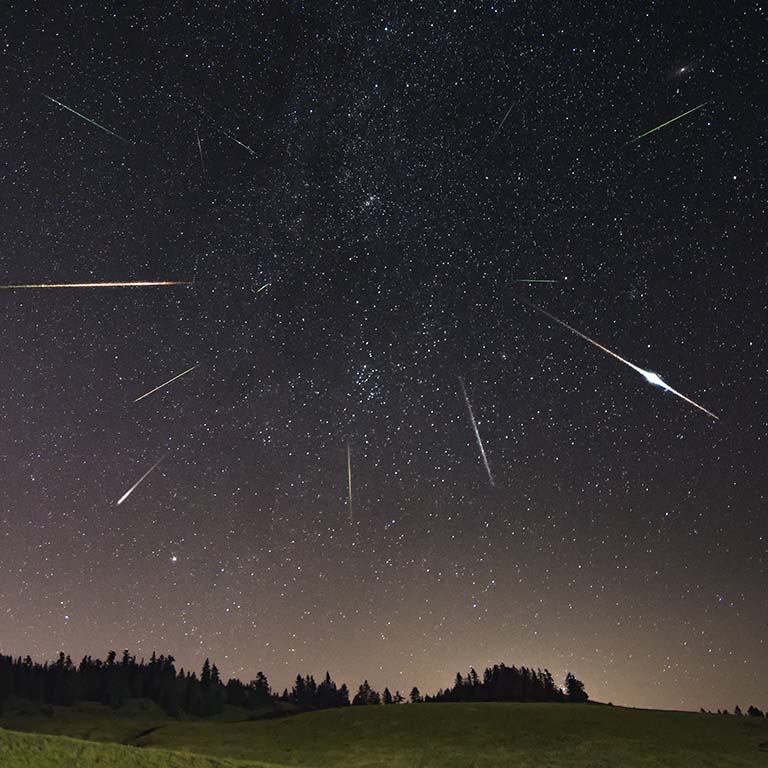BLOOMINGTON, Ind. -- The annual Perseid meteor shower happens on warm summer nights, when gazing at the starry sky is always enjoyable. This year the Perseids will peak on the night of Aug. 12-13. The moon will be almost new, so moonlight will not interfere with observing meteors.
The Perseids will perform for most of August, though there will be fewer meteors to see the farther from the peak date you watch. If the peak is hidden by clouds, look for the bright streaks again as soon as the night sky is clear. Try to avoid artificial lights.
Face east and look about halfway up the sky from the horizon. You won't need binoculars or a telescope, because the meteors move much too fast for those instruments. The Perseids produce more of the extremely bright meteors called fireballs than any other shower. The chances of seeing a fireball will be greatest near dawn.
The Perseids may appear anywhere in the sky, but they will seem to originate from a point called the radiant in the constellation Perseus, which gives these "shooting stars" their name. The higher the radiant is above the northeastern horizon, the more meteors will be visible. Perseus is just north of the W-shaped constellation Cassiopeia in the Milky Way. Meteors near the radiant will have short trails because we see them nearly straight on, while those far from the radiant will look longer because they are seen from the side.
Most meteor showers happen when Earth crosses the orbit of a comet. The Perseids come from Comet Swift-Tuttle, and the meteors are caused by particles released from the comet's nucleus and left behind in space. As Earth plows through this stream of debris, ranging in size from sand grains to pebbles, each particle slams into our atmosphere at a speed of more than 30 miles per second and burns up almost instantly from friction with air molecules. The resulting heat momentarily creates a streak of glowing air that we see as a meteor. All of this happens about 60 miles above the ground, regardless of how close some meteors may appear.
Planets
Saturn will reach opposition on Aug. 27, and the ringed planet will be visible from dusk to dawn in the constellation Aquarius. At the start of the month it will rise by 9:30 p.m. local daylight time and be 25 degrees above the southeastern horizon by midnight, well placed for viewing. A telescope will show the sunlit side of the rings, which will be tilted toward Earth. Orbiting Saturn in the same plane as the rings is a collection of moons. The largest is Titan, which will be north of the planet on Aug. 7 and 23 and south on Aug. 15 and 31.
Jupiter will rise soon after midnight on Aug. 1. It will be more than 40 degrees above the eastern horizon in the hours before dawn, when it will be best placed for observing.
Venus will emerge from the solar glare on Aug. 21 as a bright object 4 degrees above the eastern horizon a half hour before sunrise. By month's end the planet will be 10 degrees high in the constellation Cancer about an hour before sunrise.
Mercury and Mars will be close to the western horizon and difficult to view during August.
Moon phases
The moon will be full on Aug. 1, at last quarter on Aug. 8, new on Aug. 16, at first quarter on Aug. 24, and full again on Aug. 30.
Author: Hal Kibbey Email: hkibbey [at] gmail.com


 The College of Arts
The College of Arts